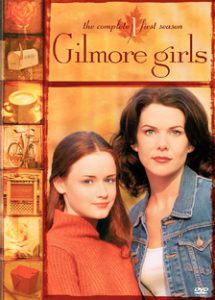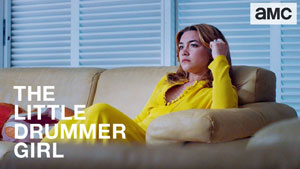A friend mistook “The Little Drummer Girl” for a Christmas series, and I explained that’s not what it is. As for what it really is, there’s the short version and the long version. Simply, it’s an espionage drama set amid the forever war between the Israelis and the Palestinians in the 1970s. AMC’s seven-hour miniseries has all the twisty spy intrigue you could want, but its strongest elements are the character study of English actress Charlie (Florence Pugh) and the amazing set and costume design. A viewer feels every minute of the run time, though, and often might desire to watch something more upbeat, like Norwegian death metal videos or snuff films of kittens being strangled.
Inasmuch as the song “The Little Drummer Boy” is about a boy who plays music to earn approval, “LDG” follows a young woman who sounds opinionated during political chats at her troupe’s after-parties but, if pressed, might not truly believe in anything. On vacation in Greece, Charlie meets Gadi (Alexander Skarsgard), the very definition of a mystery man. Slowly, these two seemingly blank slates connect.
Pugh is the show’s breakout star; I was intrigued by her from the horror flick “Malevolent” and now she’s on my “I have to see everything she does” list. I might not have made it through “LDG” without her. As Charlie, she is a mix of regal bearing and girl-next-door accessibility, of fragility and incredible reserves of courage. The costume designers outfit her in tasty pastels from the era, and placed against backdrops such as the Acropolis – where Charlie and Gadi feel each other out in an intense first date of sorts – she’s mesmerizing, like a figure from a gilded-frame painting.
Glorying in a backlit Acropolis might be cheating, but the set designers are equally adept at showing the Israelis’ gloomy staging area in Germany; even the architecture seems ’70s-ish, with a quirky separator in the middle of the top-floor room.
Director Chan-wook Park frames Kurtz (“The Shape of Water’s” Michael Shannon, with a mustache and a gravelly accent) in the foreground and Gadi in the background, almost hidden behind that weird wall. Adding to the feel of the times, Park and his crew pepper in zooms and editing tricks – like an open mouth fading to blackness, then to an eye – that are like something a 1970s arthouse director would use upon having discovered such things are possible.
Gadi hardly says a word, making both Charlie and a viewer wonder what his deal is. Skarsgard does so much silent or understated acting – see another great miniseries, “Big Little Lies” – that it’s possible he doesn’t know how to act at all and he simply stands in front of cameras and smolders. But he’s undeniably a presence. Gadi is an Israeli operative tasked with drawing in Charlie as a recruit. (As an illustration of how complex this intrigue is, IMDB calls Skarsgard’s character “Becker.” I’m using “Gadi” because that’s what he’s most often called, although he also goes by a few other names.)

His boss, Kurtz, thinks Charlie is a dream combination of acting skills, boredom and naivete that could be the perfect tool for infiltrating and taking out several Palestinian cells. Between watching these three act and enjoying the 1970s trappings, “LDG” is a pleasure to watch.
Except when it’s difficult to watch. This is homework, but homework that made me smarter by the end. The miniseries opens with a Jewish family, including a young child, being blown up by a suitcase bomb in their London home. It ends with a viewer having gained sympathy for some of the terrorists, with a middle section showing the daily lives of Palestinians, including Charlie’s new young friends. The youngsters are able to giggle and have fun, but even back then, they fear a sky that could produce Western bomber planes at any moment.
Charlie has empathy for many people she encounters, even though her treatment is often abominable, as the movers and shakers on both sides (really, there are at least four sides, but I’m keeping it concise here) have to make sure she is the real deal.
“LDG” goes deep into the weeds of what it takes to be an effective undercover agent; it ain’t just throwing on a wig and glasses — although Charlie does do that. Much of the first half of the series is Gadi training Charlie with lessons such as “Don’t answer too quickly” and “Never admit to a mistake.” Later, we see these lessons serve her well in enemy territory – although she doesn’t necessarily see her target, the “beautiful” Khalil (Charif Ghattas), as the enemy.
“LDG” is intimidating in its length, but it needs to be this long so we can let the sadness of the predictably endless Middle Eastern conflict soak into our bones. Adding insult to injury, of a sort, is the fact that this is set in the 1970s and based off of John le Carré’s 1983 novel, and nothing has changed since then.
While her pastel prints give way to leather jackets and Palestinian military garb, Charlie remains a source of brightness. Not because she’s ever anything but worried and scared, and not because her desire to please people stays intact (it does, but it shifts to a darker flavor). Rather, it’s because she’s the one person who started as a blank slate, without the Israeli DNA of espionage and revenge or the Palestinian DNA of terrorism and fighting back.
In the end, only a fictional creation of an author could see so much of this conflict, from all sides. As such, Charlie’s lack of belief in anything is stronger than ever. My belief is this: “The Little Drummer Girl” is a pretty great series – even though I’ll be seeking out Pugh’s next role rather than a rewatch of this one.

